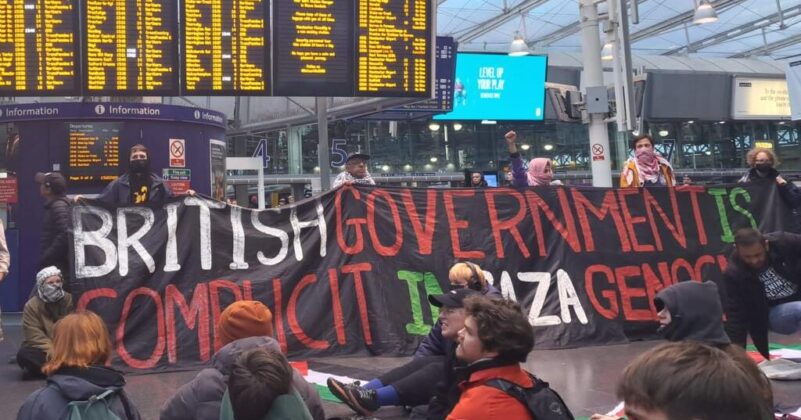

Israel’s bloody assault on Gaza and the UK government’s unconditional support for the onslaught has prompted the biggest antiwar demonstrations since the invasion of Iraq in 2003.
Rallies, pickets, and blockades have mushroomed with people taking direct action to stop British complicity in Israel’s occupation and war against the Palestinian people. Here we present a snapshot of protests attended by Workers Power members.
BRISTOL has had two demonstrations since the Gaza bombardment began. The first had 500 people, the second around 5,000. Both, particularly the second which marched from Shah Jalal mosque in Easton into the centre of town, were young, vibrant and angry. When Green Party co-leader Carla Denyer attempted to emphasise Israeli’s ‘suffering’ and made an abstract call for ‘peace’, her speech was drowned out by chants of ‘From the river to the sea Palestine will be free’, and ‘Israel is a terror state’.
In GLASGOW, weekly demonstrations of thousands have highlighted the diversity of the city’s multinational working class. Since 1999, Glasgow has been the UK Home Office’s largest dispersal area for asylum seekers, which has generated a strong migrant and refugee solidarity movement. The vibrant scene of migrant and anti-imperialist activism has been evident on the protests, with many flying the flags of their own countries alongside the Palestinian in solidarity.
The war has sparked the biggest protests in LEEDS for many years. The first on 14 October was called just a few days before by Leeds PSC and drew over a thousand protesters to the busiest shopping street before an impromptu march to the BBC.
On the next two weekends, up to 3,000 assembled for marches and rallies. City centre residents have leaned out of their windows to join the chanting, restaurant workers have stepped out to cheer the demonstrations, and the marches have swelled with people spontaneously joining in en route.
100 students staged a walk out from Leeds University at the end of October, demonstrating the potential for another wave of university occupations like those staged in 2008 against Israel’s Operation Cast Lead. The movement must urgently discuss how to escalate from weekly marches.
In LONDON hundreds of thousands have turned out on weekly marches which sent Rishi Sunak and Keir Starmer a clear message: no war in our name! Across the capital activists have stepped up the resistance, with sit-ins at Waterloo and Liverpool St stations, a tactic which should be copied at other major transport hubs.
MANCHESTER has seen large demonstrations each week, and students have organised protests at Manchester and Salford universities calling on the institutions to break their links with the Israeli military and companies linked to the occupation.
Workers assemblies
Trade unionists are organising workers’ assemblies for Palestine, bringing together activists from across the labour movement to discuss what we can do to bring the power of the organised working class to bear in solidarity with the Palestinians.
Every worker can do something, no matter how small. First of all join a union. Start by taking a collection for Medical Aid for Palestine in your workplace, and asking people if they want to go to the weekend demonstrations together.
The assemblies should be organised across the country. Almost the whole trade union movement is affiliated to the Palestine Solidarity Campaign and supports BDS—but the leaders don’t do anything except give speeches. The mass protest movement is already causing cracks in Keir Starmer’s uncritical lining up behind the Zionists and US imperialism. If workers organise at the grassroots, we can not only end Labour’s shameful support for Israel’s war but strengthen our own ability to organise for better pay and working conditions.
Defend the right to protest
The far right Tory home secretary, Suella Braverman, has launched a cynical attack on the solidarity movement over the 11 November march. This is part of her permanent leadership campaign, appealing to the most reactionary parts of the Tory membership. But it also shows that the scale of the movement is encouraging our rulers to step up repression. The hysterical fuss over a march against war Remembrance Day only reveals it to be what it is—a hypocritical celebration of imperialist wars. It is not mandatory to observe a minute’s silence or to bend the knee to this pro-war poppy hysteria. It is right to march, and stewards should defend marchers against any police provocations.